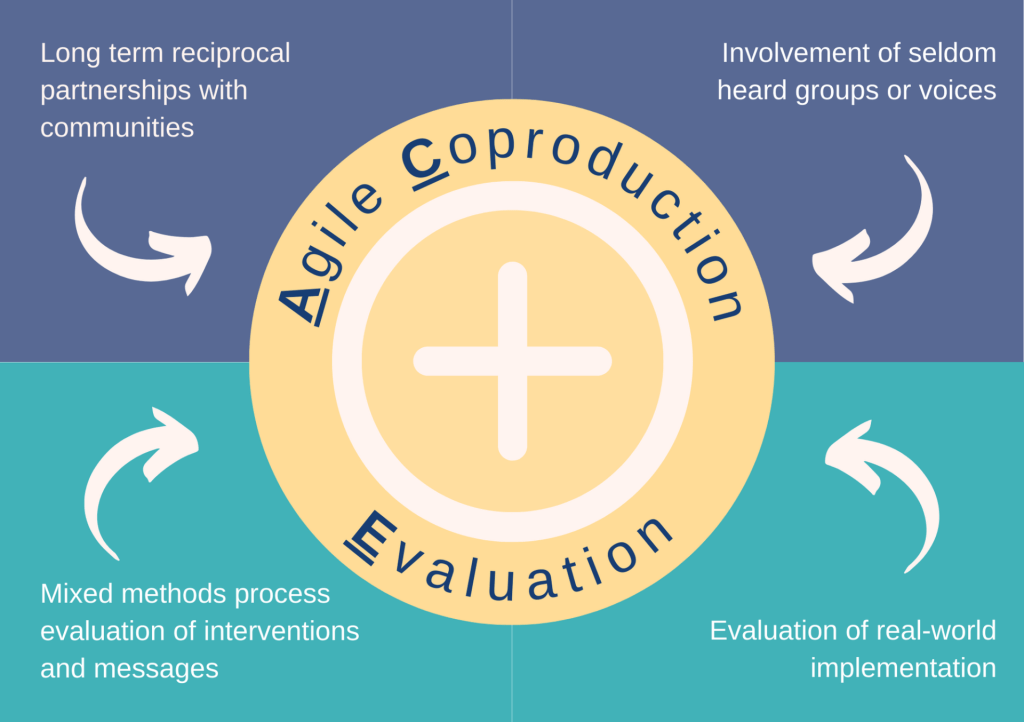15 July 2024
A new review has identified a lack of approaches to support the use and evaluation of behavioural science in intervention and guidance development during emergency responses. The review, by Zelenka Martin et al. and co-led by academics from the HPRU in Behavioural Science and Evaluation (HPRU BSE) and NIHR ARC West, has been published in Perspectives in Public Health.
Behavioural science has an important role to play in the response to public health emergencies. During the COVID-19 pandemic, interventions needed to be developed and rolled out rapidly. This was challenging for public health researchers and frontline workers.
Some of the researchers involved in the new review helped develop a novel Agile Co-production and Evaluation (ACE) framework in response to the pandemic. ACE supports rapid development of effective interventions and messaging through a combination of co-production methods with large-scale testing and real-world evaluation.

What did they do?
While developing ACE, the team carried out a scoping review to find behavioural science resources that could be used in an emergency context to develop and evaluate:
- Public health guidance
- Messaging
- Interventions
They then looked at whether these resources included the components of ACE:
- Rapid development and implementation
- Co-production with patients or the public from diverse communities
- Inclusion of evaluation
They included reports which discussed a framework or guidance for using behavioural science in response to a public health emergency. They used a narrative synthesis and grouped data according to:
- Who is producing guidance and frameworks
- Emergency contexts
- Co-production with patients or the public
- Consideration of how to engage diverse populations
- To what extent approaches incorporate testing or evaluation
- Who approaches are being created for
What did they find?
They found 17 relevant reports covering a range of emergency contexts, primarily COVID-19. Importantly, they did not identify any approaches using all components of ACE. Commonly used approaches included:
- The Behavioural Change Wheel
- The Capability, Opportunity, and Motivation Behaviour model (COM-B model)
- Social identity theory
Three reports discussed co-production with the target audience and consideration of diverse populations. Four reports incorporated rapid testing, evaluation or validation methods. Six reports stated that their approaches were designed to be implemented rapidly.
The team identified the following similarities across the studies:
- The challenge of identifying behavioural science knowledge in an emergency context, and the importance of consensus so this knowledge is communicated consistently. They identified relatively few accessible approaches designed to facilitate the use and evaluation of behavioural science in intervention and guidance development during emergency responses.
- The importance of a multidisciplinary approach to behaviour change interventions in emergency response to help translate specialist knowledge into lay terms that can be efficiently used in an emergency. Only three reports incorporate co-production with the target population and consider engagement with diverse communities, though others recommend participation of key stakeholders.
- A lack of robust evaluation of past applications of behavioural science in emergency contexts. For example, only four reports incorporated rapid testing, evaluation, or validation methods for interventions.
What do their findings mean?
The review supports the need for the ACE framework because they did not identify any existing resources incorporating all its components. Further research to develop ACE methods to support rapid implementation, co-production with the public including less-heard voices from diverse communities, and evaluation is vital for future emergency preparedness.
Alice, lead author of the study conducted as part of her MSc in Public Health, said:
“Having appropriate tools to respond to public health emergencies is essential. This review shines a light on the absence of behavioural science resources to support emergency responses.
“Conducting this review for my MSc dissertation helped develop my skills in evidence synthesis, writing and behavioural science.”
Clare French, Research Fellow in Research Synthesis, HPRU in BSE, senior author said:
“This timely review highlights the need for the ACE framework to support the rapid development of effective interventions and messaging as we plan for future pandemics and other public health emergencies.
“It is notable that co-production with the target audience and consideration of diverse populations, a key component of ACE, was mentioned in very few of the existing approaches or resources.”
Read the paper
Further information
About the NIHR
The National Institute for Health Research (NIHR) is the nation’s largest funder of health and care research. The NIHR:
- funds, supports and delivers high quality research that benefits the NHS, public health and social care
- engages and involves patients, carers and the public in order to improve the reach, quality and impact of research
- attracts, trains and supports the best researchers to tackle the complex health and care challenges of the future
- invests in world-class infrastructure and a skilled delivery workforce to translate discoveries into improved treatments and services
- partners with other public funders, charities and industry to maximise the value of research to patients and the economy.
The NIHR was established in 2006 to improve the health and wealth of the nation through research, and is funded by the Department of Health and Social Care. In addition to its national role, the NIHR supports applied health research for the direct and primary benefit of people in low- and middle-income countries, using UK aid from the UK government.